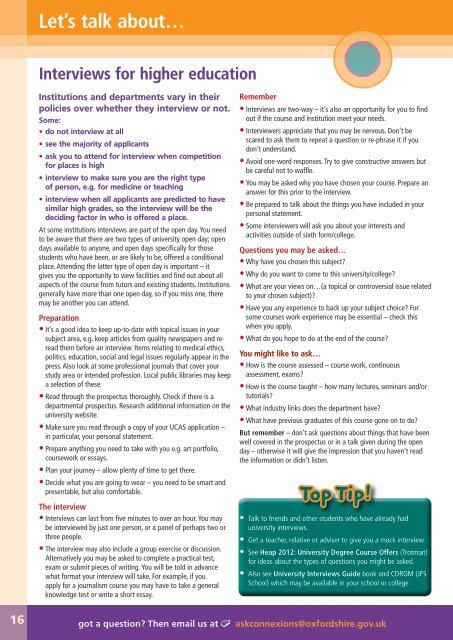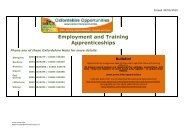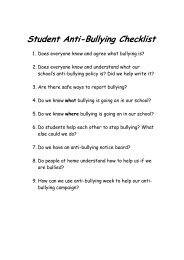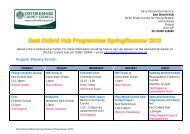Let's talk about⦠- Oxcentric
Let's talk about⦠- Oxcentric
Let's talk about⦠- Oxcentric
You also want an ePaper? Increase the reach of your titles
YUMPU automatically turns print PDFs into web optimized ePapers that Google loves.
Let’s <strong>talk</strong> about…<br />
Interviews for higher education<br />
Institutions and departments vary in their<br />
policies over whether they interview or not.<br />
Some:<br />
• do not interview at all<br />
• see the majority of applicants<br />
• ask you to attend for interview when competition<br />
for places is high<br />
• interview to make sure you are the right type<br />
of person, e.g. for medicine or teaching<br />
• interview when all applicants are predicted to have<br />
similar high grades, so the interview will be the<br />
deciding factor in who is offered a place.<br />
At some institutions interviews are part of the open day. You need<br />
to be aware that there are two types of university open day; open<br />
days available to anyone, and open days specifically for those<br />
students who have been, or are likely to be, offered a conditional<br />
place. Attending the latter type of open day is important – it<br />
gives you the opportunity to view facilities and find out about all<br />
aspects of the course from tutors and existing students. Institutions<br />
generally have more than one open day, so if you miss one, there<br />
may be another you can attend.<br />
Preparation<br />
• It’s a good idea to keep up-to-date with topical issues in your<br />
subject area, e.g. keep articles from quality newspapers and reread<br />
them before an interview. Items relating to medical ethics,<br />
politics, education, social and legal issues regularly appear in the<br />
press. Also look at some professional journals that cover your<br />
study area or intended profession. Local public libraries may keep<br />
a selection of these.<br />
• Read through the prospectus thoroughly. Check if there is a<br />
departmental prospectus. Research additional information on the<br />
university website.<br />
• Make sure you read through a copy of your UCAS application –<br />
in particular, your personal statement.<br />
• Prepare anything you need to take with you e.g. art portfolio,<br />
coursework or essays.<br />
• Plan your journey – allow plenty of time to get there.<br />
• Decide what you are going to wear – you need to be smart and<br />
presentable, but also comfortable.<br />
The interview<br />
• Interviews can last from five minutes to over an hour. You may<br />
be interviewed by just one person, or a panel of perhaps two or<br />
three people.<br />
• The interview may also include a group exercise or discussion.<br />
Alternatively you may be asked to complete a practical test,<br />
exam or submit pieces of writing. You will be told in advance<br />
what format your interview will take. For example, if you<br />
apply for a journalism course you may have to take a general<br />
knowledge test or write a short essay.<br />
Remember<br />
• Interviews are two-way – it’s also an opportunity for you to find<br />
out if the course and institution meet your needs.<br />
• Interviewers appreciate that you may be nervous. Don’t be<br />
scared to ask them to repeat a question or re-phrase it if you<br />
don’t understand.<br />
• Avoid one-word responses. Try to give constructive answers but<br />
be careful not to waffle.<br />
• You may be asked why you have chosen your course. Prepare an<br />
answer for this prior to the interview.<br />
• Be prepared to <strong>talk</strong> about the things you have included in your<br />
personal statement.<br />
• Some interviewers will ask you about your interests and<br />
activities outside of sixth form/college.<br />
Questions you may be asked…<br />
• Why have you chosen this subject?<br />
• Why do you want to come to this university/college?<br />
• What are your views on…(a topical or controversial issue related<br />
to your chosen subject)?<br />
• Have you any experience to back up your subject choice? For<br />
some courses work experience may be essential – check this<br />
when you apply.<br />
• What do you hope to do at the end of the course?<br />
You might like to ask…<br />
• How is the course assessed – course work, continuous<br />
assessment, exams?<br />
• How is the course taught – how many lectures, seminars and/or<br />
tutorials?<br />
• What industry links does the department have?<br />
• What have previous graduates of this course gone on to do?<br />
But remember – don’t ask questions about things that have been<br />
well covered in the prospectus or in a <strong>talk</strong> given during the open<br />
day – otherwise it will give the impression that you haven’t read<br />
the information or didn’t listen.<br />
Top Tip!<br />
• Talk to friends and other students who have already had<br />
university interviews.<br />
• Get a teacher, relative or adviser to give you a mock interview.<br />
• See Heap 2012: University Degree Course Offers (Trotman)<br />
for ideas about the types of questions you might be asked.<br />
• Also see University Interviews Guide book and CDROM (JFS<br />
School) which may be available in your school or college.<br />
16 got a question? Then email us at M askconnexions@oxfordshire.gov.uk






